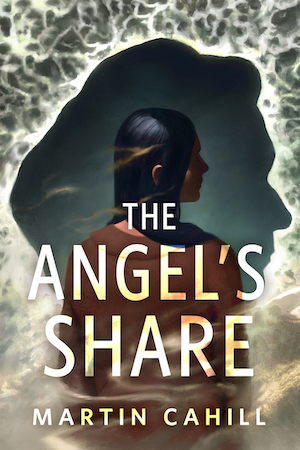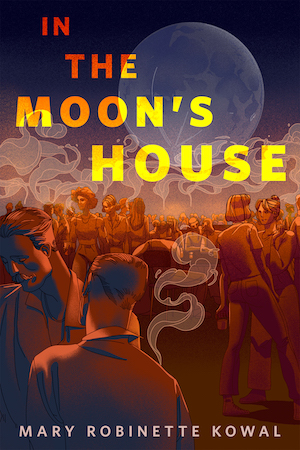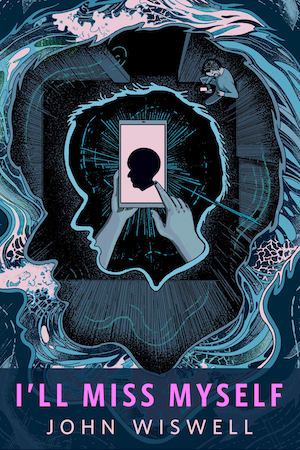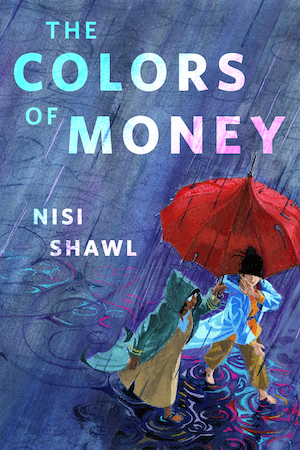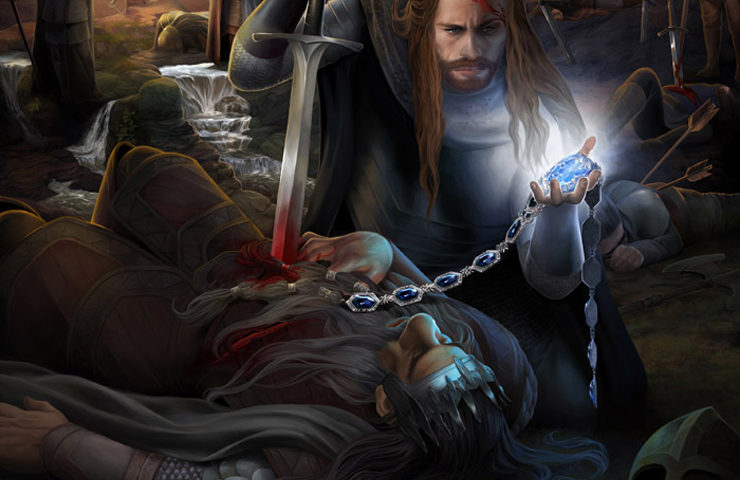In Which Morgoth Plays His Last Húrin Card, A Silmaril Raises the Stakes, Dwarves Play Too Close to the Chest, Thingol Folds, Ents Are Wild, and Menegroth Collapses like a House of Cards
In Chapter 22, “Of the Ruin of Doriath,” it’s finally time to say goodbye to Beleriand’s first kingdom of the Eldar, one whose roots began in Chapter 4 when a Teleri Elf-lord named Elwë met a goddess in the woods, changed his name, and decided to tarry indefinitely in Middle-earth. But if there’s one lesson to be learned in Tolkien’s legendarium, it’s that nothing lasts forever…even the most beautiful and majestic of works—maybe especially those. Appreciate it while you can.
Sadly, it’s the aftermath of the Tale of the Children of Húrin (especially the short, if storied, life of Túrin Turambar) that triggers the end of Doriath, as Morgoth manipulates his most famous “guest” in order to further his designs. A lost treasure is recovered, gives King Thingol some crazy ideas, and garners the wrong sort of attention. But hey, we finally get to see Ents in action!…for, like, a second.
Dramatis personæ of note:
- Húrin – Man-of-war, old codger
- Morgoth – Ex-Vala, unspeakably offensive asshole
- Thingol – Sinda, king, Elewëezer Scrooge
- Melian – Maia (not long for Middle-earth)
- Beren – Man, one-handed retiree
- Dior – Half-Elf, son of Beren
Of the Ruin of Doriath
The last chapter can generally be filed away as a victory for Morgoth, but maybe not a win on all fronts. He had indeed heaped woe upon the family of Húrin and in the process got to cross out one of the Elf-realms on his hit list.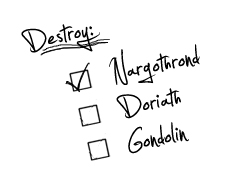 But he’d lost Glaurung in the process. He could have done so much more with the father of all dragons. Well, no matter. There are other fire-drakes in the sea, as they say (although not literally, especially since Morgoth hates the Sea and always has). And if the designs he’s been seeing in Angband’s R&D are any indication, the next batch looks promising!
But he’d lost Glaurung in the process. He could have done so much more with the father of all dragons. Well, no matter. There are other fire-drakes in the sea, as they say (although not literally, especially since Morgoth hates the Sea and always has). And if the designs he’s been seeing in Angband’s R&D are any indication, the next batch looks promising!
Húrin himself, by now Morgoth’s most famous prisoner, has grown old and grey sitting in that not-so-comfy chair up on Thangorodrim these last twenty-eight years. And all this time, he’s witnessed the disasters of his children’s lives unfold. And not just from some Orc’s secondhand account, but “through Morgoth’s eyes” directly. We’re never explicitly told how that surveillance manifested; probably some malicious mix of spy reports and actual Ainu-powered sight beyond sight.
All along, it’s been mystifying just trying to figure out what Morgoth can perceive. We’re told he knows more than his enemies guessed, but at the same time he can’t physically see everything—certainly the Dark Lord’s gaze cannot penetrate the Girdle of Melian, just as Third Age Sauron “gropes” ever to see Galadriel and her thought, but fails. Morgoth didn’t always know where Túrin was until the dude foolishly stood up and did something to give himself away (several times). Still, the secondary purpose of the Dark Lord’s torment of Húrin—to wring from him the location of Gondolin—never really worked out. Húrin never cracked, never said, “Fine, enough! I’ll talk.” But, although Morgoth may not have conquered Húrin son of Galdor so directly, the years of sorrow have certainly eroded him.
Buy the Book
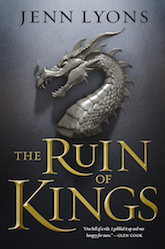

The Ruin of Kings
At long last, Morgoth lets him go free! Because at the end of the day, enough is enough, and there’s only so much evil a rogue Ainu—who once sought the Flame Imperishable all for himself before the universe was made—is capable of achieving. NOT. But seriously, Morgoth has nothing to gain by killing Húrin and might yet be able to use him still. He pretends he pities the Man’s utter defeat. But nah, that’s not really it.
Just as when Sauron lets Gollum leave Mordor in the later years of the Third Age, he, too, has a purpose. As is explained in Unfinished Tales:
But Sauron perceived the depth of Gollum’s malice towards those that had “robbed” him, and guessing that he would go in search of them to avenge himself, Sauron hoped that his spies would thus be led to the Ring.
You might think that an unfair parallel. Húrin isn’t like Gollum, surely. Húrin blames Morgoth himself for his woes, not his own friends, whereas Gollum’s hate extends beyond just Sauron. Well, Húrin’s been in a dark place for a very long time. He’s been a captive audience of Morgoth’s unfolding curse, and he’s seen only what the Dark Lord wanted him to see. Morgoth, being the chief asshole that he is, withheld all the good stuff, the happier moments of Túrin and Nienor’s lives. Húrin probably knew next to nothing about Túrin’s happier days when he was reared in Doriath as a boy and adolescent, though he certainly knows that Thingol and Melian were fostering him.
But actually, on the deeds of those two “Morgoth sought most to cast an evil light,” seeking to poison Húrin against Melian and Thingol. Why? Because the Dark Lord especially hated and feared the king and queen of Doriath, as he does so…many…things…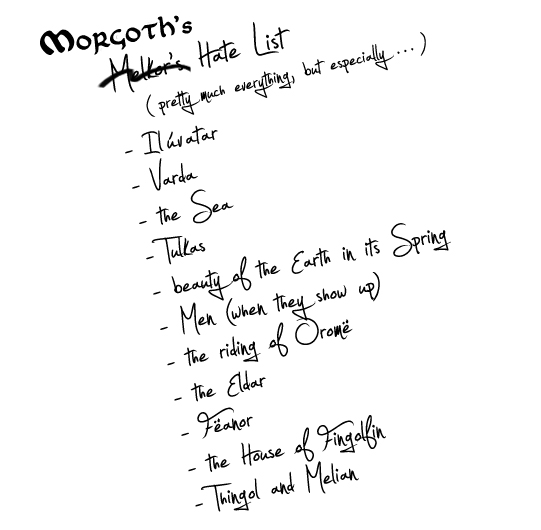
Now, Húrin doesn’t actually believe Morgoth. He knows better than anyone how much of an asshole the Dark Lord is, and that he’s incapable of pity. But that doesn’t mean he sees the ulterior motives behind his release. Well, anyway, Morgoth gives him a sword to wear and a black staff to help him on his way. So off old Húrin goes with whatever shred of dignity he’s got left, a long beard, and, I have to think, some very stiff joints. Smell ya later!
First Húrin wanders into Hithlum, where he used to live. Morgoth sends a contingent of “captains and black soldiers of Angband” to follow him, such that word goes around amongst the Easterlings who occupy the region as well as the remnants of Húrin’s own people, thinking him someone special in “league and honor with Morgoth.” Therefore no one bothers him: Easterlings don’t hinder him, but neither do his scattered old friends help him in any way. Even those who would recognize him won’t trust him now. They have to be thinking, as Shawn Marchese of the PPP supposes, “Who did you sell out to be released?”
This sure doesn’t feel like freedom.
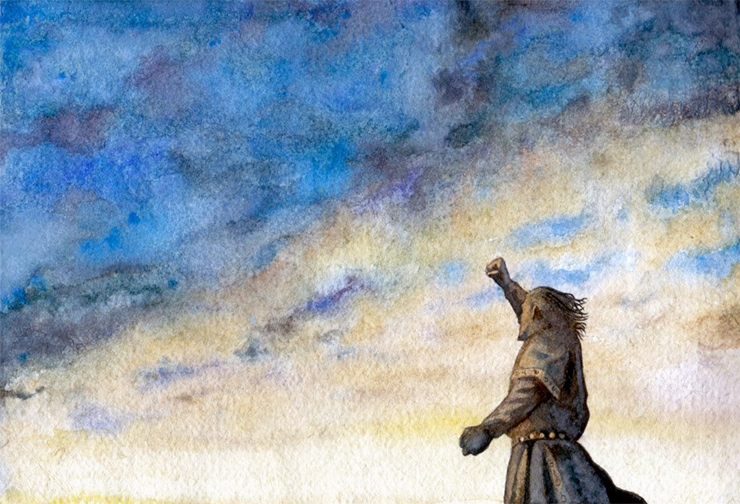
Bitterly, Húrin moves on, seeking shelter and/or comfort elsewhere. With the army of darkness no longer following him—now only Morgoth’s spies tail him—he crosses the Vale of Sirion and comes up to the edge of the Echoriath, or Encircling Mountains, in the land of Dimbar. He remembers that time when he was a boy. He and his brother, Huor, were “bewildered in the deceits of that land,” because Dimbar is right next to Nan Dungortheb, that dreadful vale where Ungoliant’s brood dwelt. Back then, the boys were picked up by Eagles, saved from the deprivations of the wilderness, and dropped off in the city of the Elf-king Turgon!
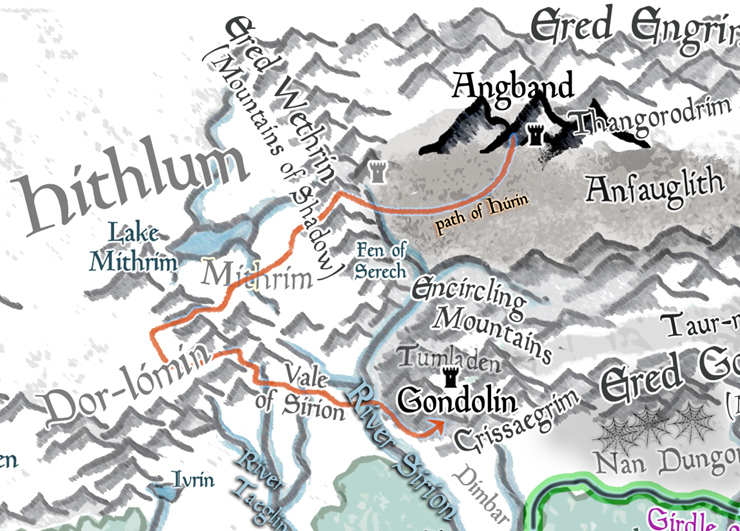
Húrin indeed remembers, and it’s one little thread of hope left. Somewhere behind these mountain walls is Gondolin—hidden, secret, safe. Maybe a good place for a tired old veteran to retire. Perhaps the Elf-king will pity him now. Why wouldn’t he? Wasn’t it Húrin and his Men who held the pass in the Battle of Unnumbered Tears, an act which allowed Turgon’s forces to escape the slaughter? Surely Turon will take in his old friend now.
He looks for the great birds, stares long into the sky and the sheer walls of the mountains. And…nothing. No Eagles, nothing but cold winds, clouds above, and shadows in the east. He cries out for Turgon, asking him to remember the Fen of Serech—where, again, Húrin and the Men of Hador had helped his ass—and the asses of all the Gondolindrim that day—in their retreat so long ago. But if anyone hears his shouts, there is no answer.

Also, just who does he think he is roaming around like some mountain hermit with a staff? A staff-wielding poster boy for Led Zeppelin?
And yet the eagle-eyed birds do see him. Of course they do. Thorondor himself, King of the Eagles, flies down into the Hidden City and brings word of Húrin’s presence directly to Turgon, whose response (if we’re being honest) is more than a little curt.
‘Does Morgoth sleep? You were mistaken.’
‘Not so,’ said Thorondor. ‘If the Eagles of Manwë were wont to err thus, then long ago, lord, your hiding would have been in vain.’
Turgon totally deserves Thorondor’s retort, because although his Ulmo-prompted secret city was the work of many Elves and many years of labor, no way would all of Morgoth’s spies been kept away without the help of the Eagles. I especially like that Thorondor name-drops his boss. You know, *ahem*, the King of Arda, mightiest of the Valar. Well, it does get Turgon to think further on the matter. If Húrin is indeed just traipsing about freely and walking right up the mountains this close to Gondolin’s location—which no one outside of Gondolin is supposed to know—then he figures his old friend must be a puppet of Morgoth’s now. Must have surrendered his will to the Dark Lord, a tragedy indeed. Gondolin has remained hidden for centuries, and Turgon has taken many pains—and let’s face it, some heat—for keeping it so. He figures he can’t afford to risk it all now, not even for Húrin. Thus Turgon’s “heart is shut,” and so he must give his old friend the cold shoulder.
Thorondor presumably shrugs his 90-foot wings then flies off, leaving the king to brood. After reflecting on all he knows about Húrin and his deeds for quite a while, the immortal Elf-king who has lived thousands of years finally softens. Has a change of heart…but…too late. He sends for the Eagles to bring Húrin in, but by this point the old Man has gone. Meanwhile, Morgoth’s spies report back to him precisely where Húrin had gone and where he’d called out to Turgon. Now Morgoth’s got a rough idea where Gondolin might be. He’s circling the Encircling Mountains on his map.
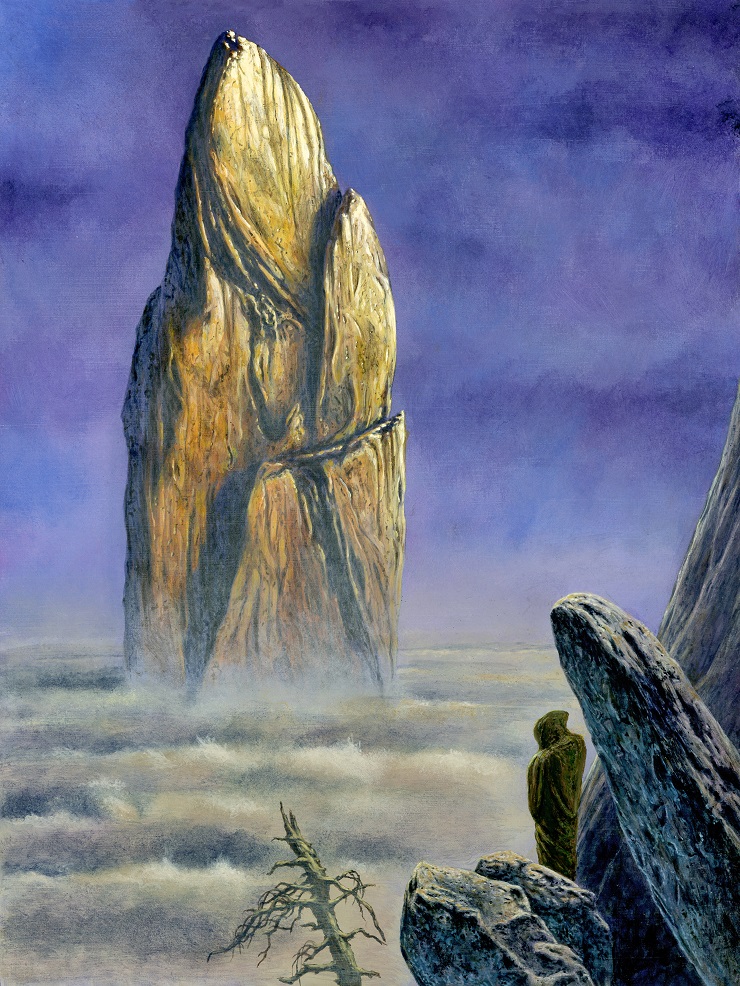
Leaving the northern realms behind him, Húrin goes south, drawn towards Brethil by the voice of his wife, Morwen, which comes to him in his dreams. Whether this is premonition, actual guidance from on high, or just his own haunted mind, we’re left guessing. But as he walks, he already knows where to go—not because he’s been there before, but because he’s already seen it one way or the other, through Morgoth’s eyes.
So one day he comes to the Crossings of Taeglin, to the site where Glaurung’s body was burned, and to the large gray stone that was placed above the mound where his son’s body was buried. Húrin is on a walking tour of Túrin’s life.
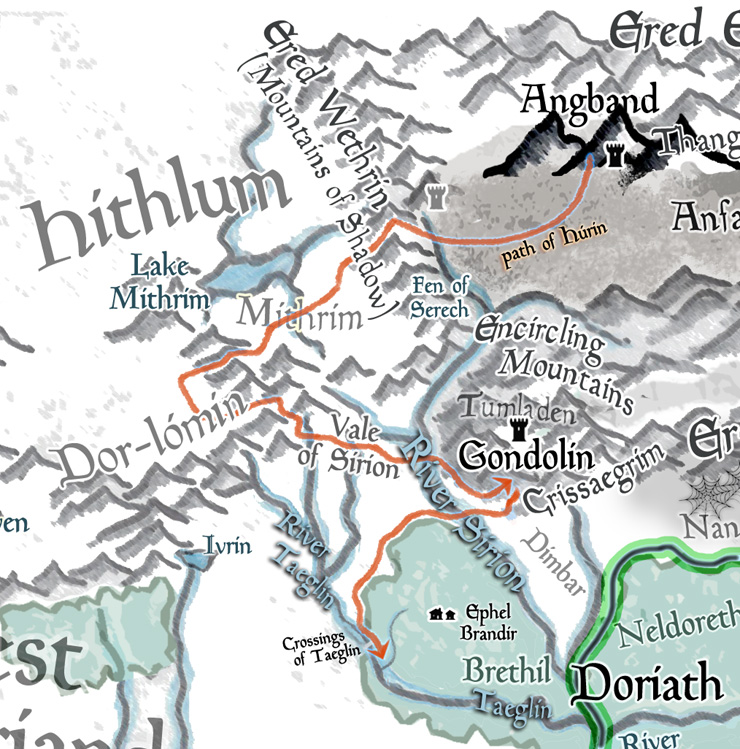
And sitting there by the gravestone of her children is Morwen! And though she is old and grey now, her eyes still shine with the light that had earned her the nickname Elfsheen. We haven’t seen her in a quite awhile, but Húrin hasn’t seen his wife in twenty-eight years! Through all his time as a captive of Angband, and all the tidings and visions shared with him, surely none would include a view of his wife, “proudest and most beautiful of mortal women in the days of old.” Morgoth would not have allowed so fair a sight for sore eyes.
Their words in this meeting are brief and laced with sorrow. These are parents whose children have all died before them—a living nightmare.
‘You come at last,’ she said. ‘I have waited too long.’
‘It was a dark road. I have come as I could,’ he answered.
‘But you are too late,’ said Morwen. ‘They are lost.’
‘I know it,’ he said. ‘But you are not.’
But Morwen said: ‘Almost. I am spent. I shall go with the sun. Now little time is left: if you know, tell me! How did she find him?’
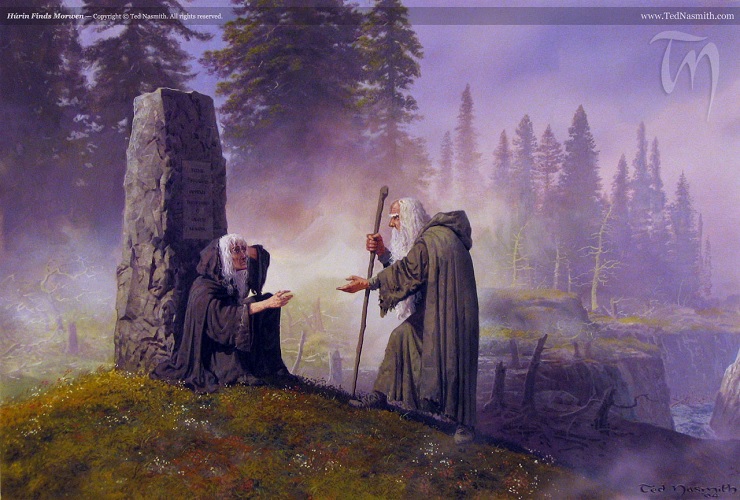
And Húrin gives her mercy by not answering her. Best if she departs this world in ignorant “bliss.” They sit together in silence by the stone, and when she dies at the rising of the sun, Húrin can see the grief on her face fade away. Death is the ultimate escape from evil and its author in this world—Ilúvatar’s gift, which even Elves cannot have. And though Húrin is a broken man, he can see his wife has retained her dignity; she was never “conquered.” She is free now.
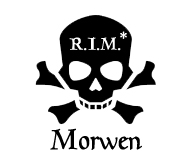
But he sure isn’t. Not yet. Moreover, deadly anger that “masters reason” now takes hold of him. He is resolved now to judge all of those who ever had dealings with his family—somehow, to him, they’re all complicit in their doom. Which is really what Morgoth wanted, naturally. Before he sets off on that errand, Húrin buries his wife near the same stone that bears the names of their children. He carves her name into it, so now three of them are accounted for.
“Spoiler” Alert: We’re told that this gravestone goes down in song as the Stone of the Hapless, and that when the seas drown “all the land”—which, again, will definitely be happening—this bit of land will remain above the waves. There’ll be a little island called Tol Morwen that survives the cataclysm.
But for now, the lands remain dry and Húrin heads south. He sees the red hill of Amon Rûdh far-off but doesn’t bother stopping. Nothing to see there! Oh, he knows all about what went down there.
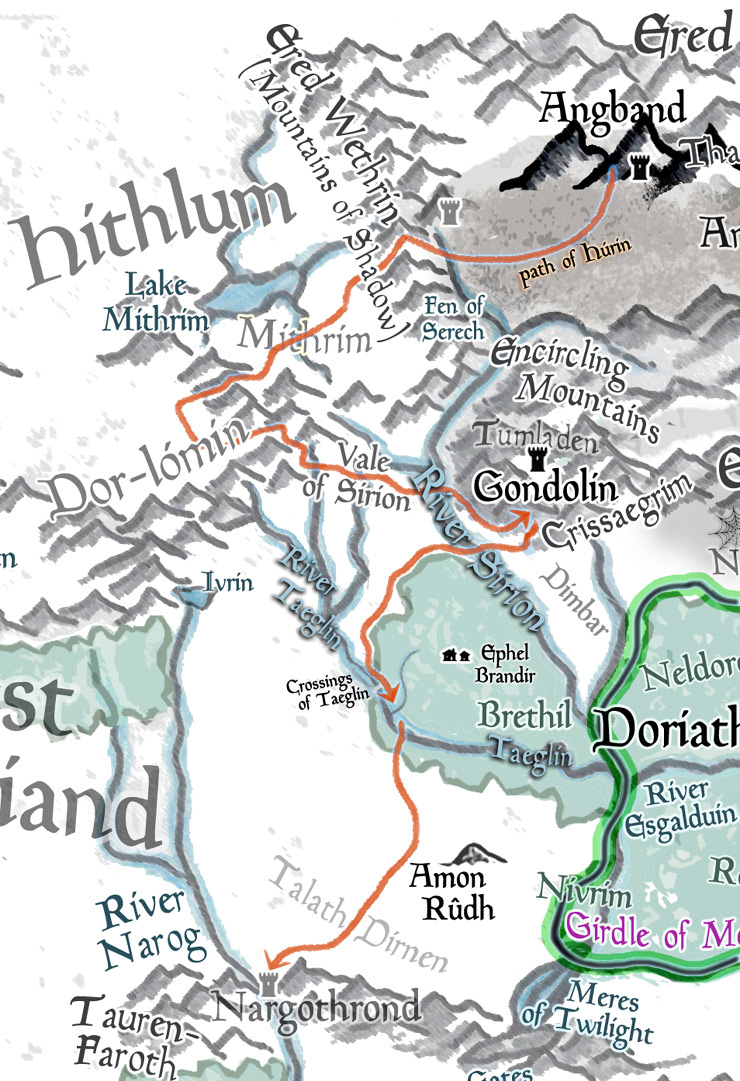
When he reaches Nargothrond, he picks his way across the broken stones of that old broken bridge in the river. And there at the similarly shattered doors of Finrod Felagund’s cave-city, he is met by the last of the Petty-Dwarves: Mîm. They’re just two grumpy old men with long beards staring at each other—one short, one shorter. Mîm has been living here for a while now, alone, just hanging with the now-unclaimed treasure hoard which surely still stinks of dragon. The very memory of Glaurung has kept everyone else away from it, as if it were haunted by his spirit.
But it looks like Mîm picked the wrong week to act indignant. He demands to know what this geriatric rando wants, and when Húrin in turn asks his name, Mîm gives it proudly. He verbalizes his claim on the spoils of Nargothrond as the last of his people. Húrin then tells the Petty-Dwarf who he is, and who his son was—who Mîm recalls all too well. *gulp* And Húrin says he knows precisely who it was who betrayed the Dragon-helm of Dor-lómin. *gulp*
Mîm’s number has finally come up. Pleading worked with Túrin but it doesn’t work with Túrin’s old man. Húrin is unmoved, so he just runs the Petty-Dwarf through as a matter of course. How nice of Morgoth to have given him a sword to help work through his murderous issues.
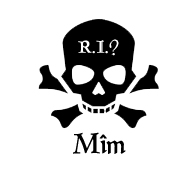
The Dwarves believe that Aulë “gathers them to Mandos in halls set apart.”
But yeah, Húrin’s on a cold-hearted errand and can’t be bothered with such as Mîm. And just like that, the last of the race of Petty-Dwarves is extinguished. So then what?
Then he entered in, and stayed a while in that dreadful place, where the treasures of Valinor lay strewn upon the floors in darkness and decay; but it is told that when Húrin came forth from the wreck of Nargothrond and stood again beneath the sky he bore with him out of all that great hoard but one thing only.
To think, this is the place where Galadriel visited her brother Finrod, where Beren later came to seek his help, where Celegorm and Curufin whipped up the people against their king and his mortal friend, where the two C-brothers later imprisoned Lúthien, where Huan the hound of Valinor busted her out, and ultimately the place where the greatest number of valuables from Valinor had been cached. Now it’s just a gloomy ruin with decaying treasures and probably loads of dragon filth. And Húrin’s got the one thing he came for.
Next stop: Doriath.
The Elves that guard the borders admit him, after the king and queen grant permission for him to pass the Girdle of Melian. Soon Húrin stands before Thingol and Melian in Menegroth—possibly even for the first time, and certainly for the last.
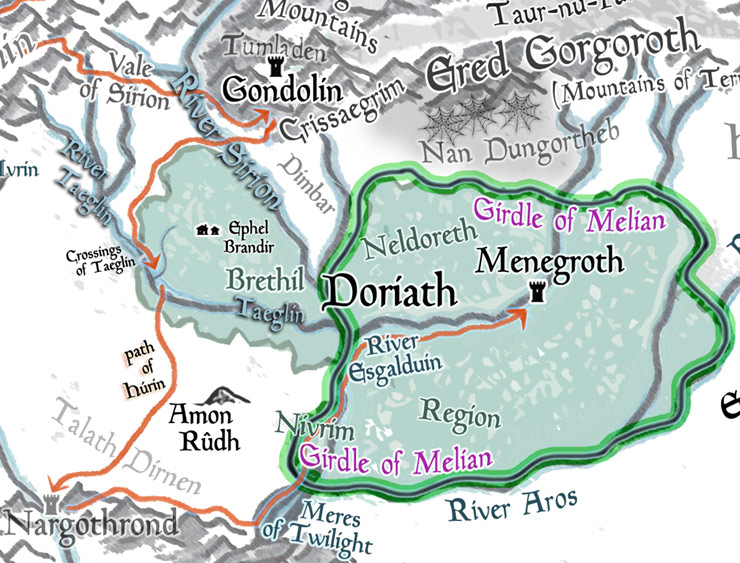
They look at him in grief and pity. He looks dreadful, and not just because of his age. The face of anyone who’s had the company of only Morgoth—and probably some ugly-ass Orc attendants—for twenty-eight years is just not going to be a congenial one. He, in turn, looks at the Elven royals who looked after his wife and kids in his long absence, but he’s not looking kindly at them. Morgoth has assassinated the character of Thingol and Melian in Húrin’s estimations.
They greet him in honor, but he says nothing at all. He simply pulls out that one prize he’d taken from Nargothrond and tosses it at the Elf-king’s feet. And it’s no less than the Nauglamír, the Necklace of the Dwarves, which had been a gift to Finrod back in the days before even the making of Gondolin, way back in Chapter 13. Wrought of gold and strewn with gems schlepped over from Valinor, this was always a kingly gift. Húrin bitterly calls it the king’s “fee” for watching over his family, and he reminds Thingol that it was left in Nargothrond by Finrod—who, by the way, went off to die seeking a Silmaril because he was helping Beren—who, by the way, was on his own suicidal quest—which, by the way, was undertaken because of Thingol. Hope you’re happy, Thingol.
Of course, Thingol is astonished to see this relic (of course he knows about his nephew’s famous Dwarf-necklace!) and he’s annoyed with Húrin’s scornful words, but pity for this Man who must have been through the Dark Lord’s wringer keeps him in check. Melian being Melian, however, cuts straight to the heart of it. See, the Maia queen doesn’t mince words. When you get her wisdom, you get it unfiltered. She’s the real article. What you see is what you get (as well as a great deal more). She says:
Húrin Thalion, Morgoth hath bewitched thee; for he that seeth through Morgoth’s eyes, willing or unwilling, seeth all things crooked. Long was Túrin thy son fostered in the halls of Menegroth, and shown love and honour as the son of the King; and it was not by the King’s will nor mine that he came never back to Doriath. And afterwards thy wife and thy daughter were harboured here with honour and goodwill; and we sought by all means that we might to dissuade Morwen from the road to Nargothrond. With the voice of Morgoth thou dost now upbraid they friends.
And her words are an ice bucket of clarity, cutting right through the deception that clouds Húrin’s mind. For once—that we know of—someone finally listens to Melian and takes her words to heart. And her eyes! After all, her whole lovely face shines with the “light of Aman” and the Two Trees of Valinor like no other. Húrin stares into those eyes for a long time and sees the heartbreaking truth, tasting “at last the fullness of woe that was measured for him by Morgoth.”
He picks up the Nauglamír and places it more respectfully in Thingol’s hands, asking him to accept the treasure “from one who has nothing.” But he concludes:
For now my fate is fulfilled, and the purpose of Morgoth achieved; but I am his thrall no longer.
And this marks the end of the line for Húrin. He walks away, and everyone he passes looks at him and sees the gravity of his doom. No one stops him or even observes where he goes. He just ups and disappears from all history. Húrin has no desire to live and nothing left to do. The Elves believe “the mightiest of the warriors of mortal Men” simply cast himself into the sea. There is no memorial, no gravestone, no future isle.
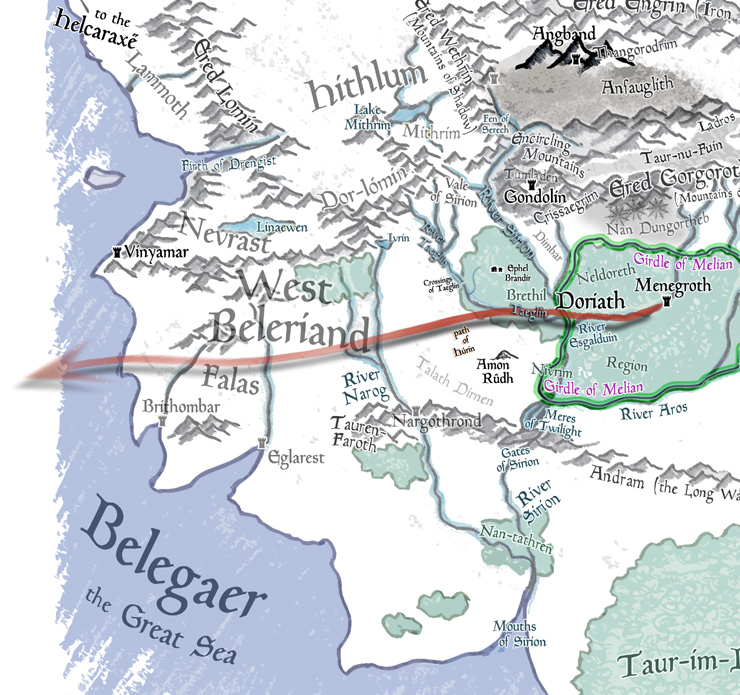
At this point the narrative pans out again and we see the aftermath of Húrin’s gift unfold rapidly, even though the events themselves play out over the next couple of years. And it starts with Thingol going down a lonely and ill-advised path. Rather, he had been going down this path for a while already, but now it really picks up speed.
Remember, Thingol has in his possession a Silmaril, the same one cut from Morgoth’s crown by Beren. The text itself smartly reminds us that this is a “jewel of Fëanor,” as Thingol’s obsession with it sure does sound familiar. He’s become bound to its power and beauty, and won’t even part with it while sleeping. Which I’m sure Melian just loves.
But actually, it was she who first called it, way back in Chapter 19 when Thingol impulsively demanded a Silmaril as a requirement for Beren to have his Lúthien’s hand in marriage.
For you have doomed either your daughter, or yourself. And now is Doriath is drawn within the fate of a mightier realm.
Indeed, they have already lost their daughter. At this very time, Lúthien is still alive, living her second life with Beren on Tol Galen down in Ossiriand, but she’s not coming back to Doriath. And now the doom returns to Doriath itself. The sons of Fëanor have demanded the Silmaril once already, probably many times. Thingol has always brushed that off. He’s not worried (enough) about the sons of Fëanor and their Oath; the Girdle of Melian keeps them out.
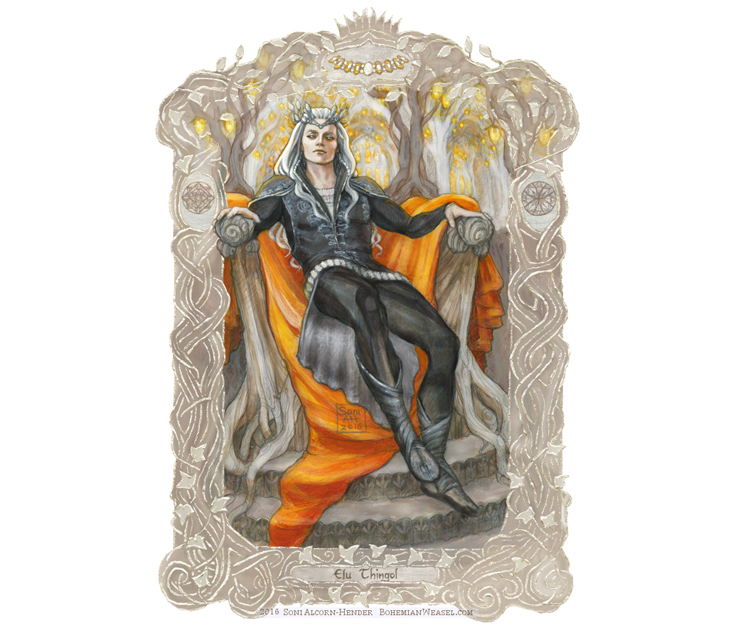
But now that he’s got both a Silmaril and the Nauglamír, he has the genius idea to combine them. Why not set the Silmaril in the Dwarf-necklace, which is itself already adorned with wondrous gems from Valinor? Two great tastes that taste great together! A bit excessive, to be sure, but to Thingol, the foremost of Beleriand’s kings, apparently it’s a no-brainer. Chocolate and peanut-butter together? Yes, please. The necklace shall be reworked, then, remade. Nauglamír 2.0.
He outsources the job to Dwarves from the Blue Mountains. Why not? He’s worked with them so many times before; they helped him construct Menegroth and had been paid well for their services. Up until now, they’ve had a pretty good relationship, even though they don’t come around so often anymore. Why, they’ve even got chambers and smithies in the bowels of the Thousand Caves solely for when they do come to visit and work. But unfortunately, when the Dwarf-smiths come by nowadays, they do so with large armed companies. Which they hadn’t had to do back in the day, before Morgoth broke the leaguer of the Noldor. Back then, whenever they came walking down from their mountains west along the Dwarf-road and right up to the woods of Doriath, there weren’t Orcs and wolves and Eru knows what else roaming the countryside to worry about. But now? The wilds of Beleriand are rough, you’ve got to have protection on the road. No more happy-go-lucky “Heigh-ho, heigh-ho…”
Which all really turns out to be bad news for Thingol.
When the Dwarves of Nogrod—specifically it’s craftsmen from that city who have recently come—look upon the Nauglamír, they’re impressed. This was the work of their own fathers, for it was crafted centuries ago for Finrod Felagund (who everyone liked) in the prime of his reign. And then they see the sizable glowing stone that Thingol wants installed therein: the Silmaril, which still shines forth with its own radiance from the blended light of the Two Trees of Valinor. Holy shit this thing is amazing!! Straightaway a lustful desire to have both necklace and jewel takes hold of these Dwarves, but they zip their lips and agree to the commission.
Thingol is that customer who brings a folding chair and sits there and watches you work on his car, right there in your shop. Making you uncomfortable. He hovers over the Dwarves as they work in their smithies, mostly because he refuses to be parted with the Silmaril and needs to keep in close proximity. One hopes, at least, that before he went down into the subterranean workshops, his last words to Melian were nice ones. Because he’s just one guy—one Elf, mighty Calaquendë though he is— hanging out with a bunch of covetous Dwarf jewel-crafters and all their well-armed bodyguards. Foolish.
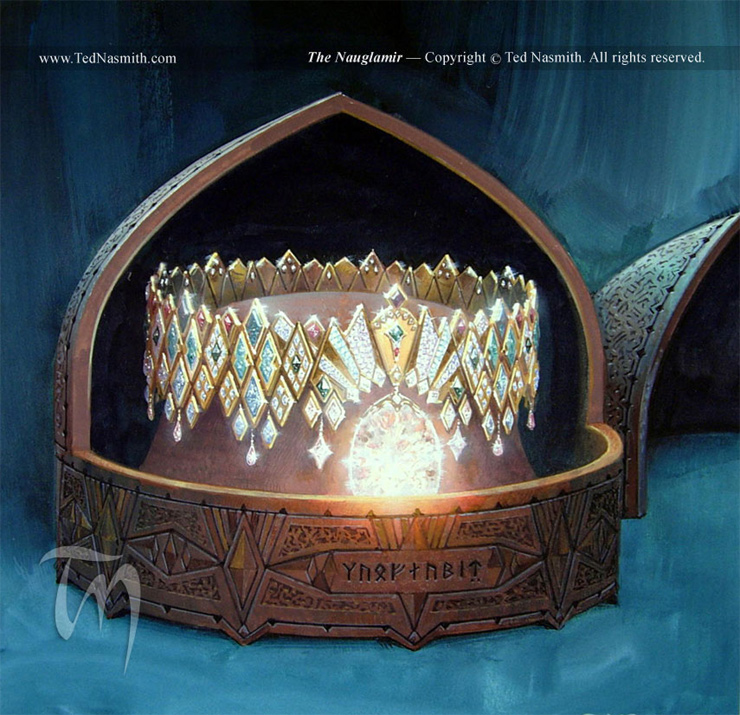
When the necklace is finished, and its gems now reflect the Silmaril set among them in “marvellous hues,” Thingol reaches for it. He cannot wait. A worthwhile commission on his part. But then the Dwarves reveal their desire. They withhold the Nauglamír and demand what claim he has on it after all. It was made by Dwarves for Finrod Felagund, who is dead now, and Thingol only has it because a Man stole it from the hoard of Nargothrond—which, by the way, was itself first wrought by Dwarven hands, too. Which rather echoes a bit of Boromir when he tries to take the One Ring from Frodo:
It is not yours save by unhappy chance. It might have been mine. It should be mine. Give it to me!
Now, the jewelers of Nogrod make no mention of the Silmaril that’s now part of the Nauglamír; they’re arguing semantics about the Necklace itself. That one of the greatest works of the Children of Ilúvatar just happens to be attached to it is just…a total coincidence? Yeah, happenstance. That’s the ticket!
Well, the Elf-king sees their pretext for what it is, and his reaction is vintage Thingol. After all his seemingly uncharacteristic sympathy over the course of the last few chapters, now we see him at his worst again. I never thought Thingol was a terrible guy, or even a terrible king; but he absolutely is too haughty for his own good. And there, standing alone among the Dwarven craftsmen and their well-armed guards, he verbally screws the pooch.
How do ye of uncouth race dare to demand aught of me, Elu Thingol, Lord of Beleriand, whose life began by the waters of Cuiviénen years uncounted ere the fathers of the stunted people awoke?
Truly, Thingol’s words showcase his greatest hits: racism, arrogance, and disdain. (If you look in the Middle-earth Dictionary under the word superciliousness, you’ll find a handsome portrait of Elu Thingol, Lord of Beleriand, there.) He’s even playing the senior card; but wow, to actually hear for the first time that he was born, if not “awakened,” right there in the pre-Oromë birthplace of the Elves is rather stunning. He’s among the oldest of the Children of Ilúvatar! Not to mention the physically tallest, standing here among the physically shortest.
And he’s not necessarily in the wrong here—these Dwarves did intend to take the Nauglamir+Silmaril away with them when their work was done—but he sure isn’t wise to speak like this to their bearded faces. Not without Mablung having his back or something, or even Melian.
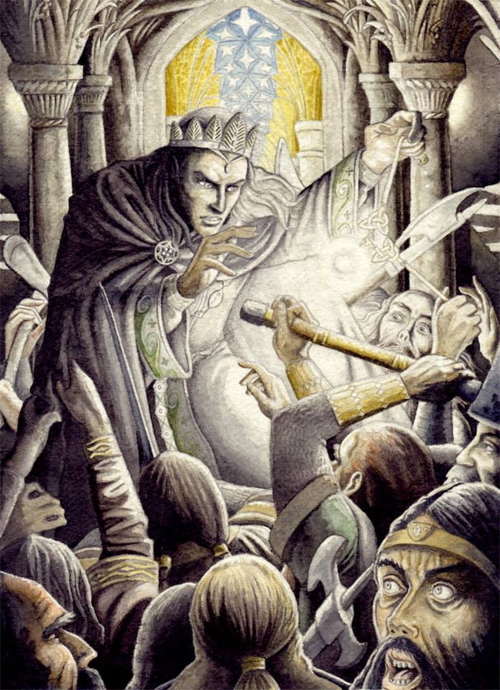
He caps off his rant by telling them to scram without any payment for their work. I mean, they’ve just finished their contribution to the “greatest of the works of Dwarves and Elves” that were ever brought together—the Silmaril for the Elves and the Nauglamír for the Dwarves. I mean, were they doing this unparalleled work pro bono? Of course not. And is the narrator suggesting that this carcanet, set with gems uncounted and which rests as lightly as a strand of flax, is greater an achievement than, say, the whole of Khazad-dûm far away? Possibly! That’s some bauble! But hey, this is Tolkien; magnificent and dangerous jewelry is kind of his thing.
Well, that’s it for the Dwarves. They were just going to hasten away, but now they’re really pissed. There have been squabbles and even some violence between Dwarves and Elves in the past, usually in the wilderness, such as between the Sindar and Petty-Dwarves, but there’s something about this moment which makes it more official. More political. This is Menegroth, as close to metropolitan as you can get in Beleriand, Gondolin not (for long) withstanding.
What happens next is referenced, even in The Hobbit, as the chief grievance between Elves and Dwarves in Middle-earth, and is surely the origin for the distrust between Legolas and Gimli much later. And of course, it’s terrible moments like this that Ilúvatar himself foretold back when Aulë first made the Dwarves:
and often strife shall arise between thine and mine, the children of my adoption and the children of my choice.
Strife indeed: The Dwarves slay the Elf-king right there as he stands among them, possibly by mass stabbing, à la Caesar’s end. And the last thing Thingol sees isn’t the lovely face of his wife, as he might have wanted, but the damn Silmaril he all-too-hastily followed to his ruin. 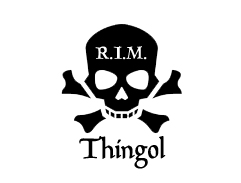
The king is dead, long live…whoever inherits this mess!
The Dwarf jewelers and their guards hurry their way up and out of Menegroth, speeding as fast as they can with the Silmaril-inlaid Nauglamír. East toward the exit of Doriath, east toward their home in the mountains. But the Elves are fast, and dangerous even over long distances. Once Thingol’s fate is discovered, it’s curtains for the Dwarves. At least, most of them. Only two Dwarves manage to survive the wrath of the Sindar and make it all the way back to the city of Nogrod in the Blue Mountains, sans Nauglamír. At which point those two survivors “told somewhat of all that had befallen” and straight-up lie to their people: they claim that King Thingol ordered the death of the Dwarves.
That’s all the Dwarves of Nogrod need to hear. They wail for their lost kin and master craftsmen and arm themselves for war. And this I find fascinating, but absolutely in keeping with the patterns of the world (and of Tolkien):
It is told that they asked aid from Belegost, but it was denied them, and the Dwarves of Belegost sought to dissuade them from their purpose; but their counsel was unavailing, and ere long a great host came forth from Nogrod, and crossing over Gelion marched westward through Beleriand.
At certain points in The Silmarillion alone (to say nothing of The Lord of the Rings), each race divides at least once—and in the case of Elves, many times—wherein one group either beseeches another of their kind to join them in an ill-advised endeavor or simply chooses not to participate in the poor choices of another. We’ve seen it with the Teleri in Alqualondë opting not to help or join the Noldor storming out of Valinor. We’ve seen it with the Men of Bór not joining with the other Easterlings in siding with Morgoth. And now we’re seeing it with the Dwarves. This sort of contrast just goes to show that we shouldn’t make judgements about entire peoples. It’s not emphasized in the text, but I think it’s worth noting that it was from the Dwarves of Belegost, not Nogrod, that Thingol first sought “aid and counsel” in the construction of Menegroth. They don’t march out to stop their Nogrod brothers, but they sure aren’t going to be part of the problem.
Now we need to talk about Melian, as the death of Thingol marks the conclusion of an ancient love story. Her husband is dead. Melian sits beside his body there in the basement smithies of Menegroth and recalls their meeting in the forest of Nan Elmoth long ago, before the Sun and Moon ever were, when only stars wheeled above and the trees grew tall around them. As unprecedented as the relationship between the mortal Beren and the Elfmaid Lúthien was, the marriage of Thingol and Melian was even more so. He was born by the shores of a temporal world; she dwelled in the Timeless Halls before there was a universe at all, listened to the words of Eru Ilúvatar, and participated in the Music of the Ainur, the creation of the entire World.

But then, after entering into Arda with other Maiar, living with the Valar first on the isle of Almaren, then in Valinor, and hanging out with her bosses Vána (the Vala of youth) and Estë (Vala of healing and sleep), she did something none of her peers ever did. She went to Middle-earth, took on the physical form of the newly-awakened Elves, bound herself to one particular Elf, and through that union (a) gave birth to Lúthien, and (b) “gained a power over the substances of Arda,” the very power that allowed her to hold evil at bay.
But now that power is dissolving, as her form reverts back to its original Maiar factory settings, from which there is no maintaining the Girdle. It’s as if her physical marriage to Thingol was the on-switch. No on-switch, no power-grid. Doriath is now vulnerable. Which should be an “Oh, shit!” moment for all of Beleriand. One does not simply walk into Doriath, they always said. Well, now anyone can.
It’s a classic tale, really. Boy meets girl. Girl binds herself to the “chain and trammels of the flesh” out of love for boy. Boy gets new name (because Tolkien), becomes better for girl’s presence. Girl weaves magical fence around boy and girl’s new kingdom. Time elapses. Boy dies over trinket. Girl takes fence and goes home.
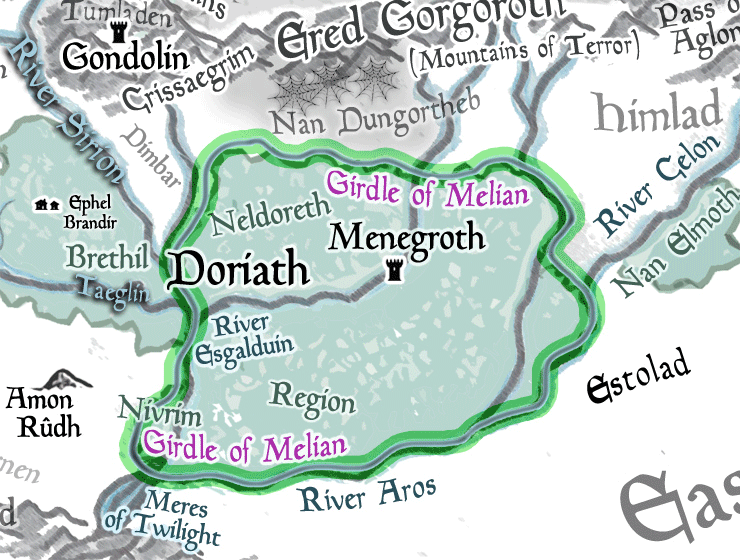
But no, that’s not quite fair. Melian isn’t leaving her people in the lurch. It’s easy to think that she’s abandoning them now. But she is not one of them. Melian is of a divine race, and this isn’t her fight anymore; Thingol with his own poor decisions has made this choice for her, and for his people. As with Túrin, he didn’t want this tragedy for them all. He just didn’t think it through, didn’t pay attention to the gravity of the situations around him. Didn’t heed her advice often enough. Melian had counseled her husband to surrender the Silmaril to the sons of Fëanor, after all. But no one listens to Melian. No one ever listens to Melian.
So yeah, I don’t blame Melian for any of this. Especially when you consider how long she’s helped keep the Sindar alive against the molestations of Morgoth—to say nothing of Ungoliant, who totally would have crept into the woods of Doriath and filled it with nightmares more than five hundred years ago. The last person to see Melian before she returns to Valinor (where one hopes she can at least visit her husband in the waiting rooms of Mandos) is Mablung, who she entreats to be mindful of the Silmaril (which is still in Doriath) and to send word of what’s happened to her daughter and son-in-law where they are living in Ossiriand.
So where, astute readers may wonder, is Galadriel in all this? We don’t get the answer in this book. But, in the “Mirror of Galadriel” chapter of The Lord of the Rings, she does offer some Silmarillion-pertinent information. Speaking of her husband, Celeborn, she says:
He has dwelt in the West since the days of dawn, and I have dwelt with him years uncounted; for ere the fall of Nargothrond or Gondolin I passed over the mountains, and together through ages of the world we have fought the long defeat.
Since Nargothrond has already fallen, this means Galadriel has also already said farewell to her royal hosts in Doriath and gone east with Celeborn across the Blue Mountains. This also makes her the first of the Noldor to leave Beleriand yet still remain within Middle-earth. Which is fitting: she’s always been a rebel, a headstrong participant in the exile of the Noldor (less so the Kinslaying), and a seeker of her own realm to rule. Yet we know from the Appendices that she and her husband will dwell in Lindon (what remains of Ossiriand at the end of the First Age) during much of the Second Age. Still, I would love to read of her of reaction to these dramatic developments in Doriath. Especially the departure of Melian; wistful, one would imagine. Melian was her mentor and friend for such a long time, and now the Maia has returned to Valinor where Galadriel’s entire family either remained (her mom and dad) or were returned to by violence (all her brothers).
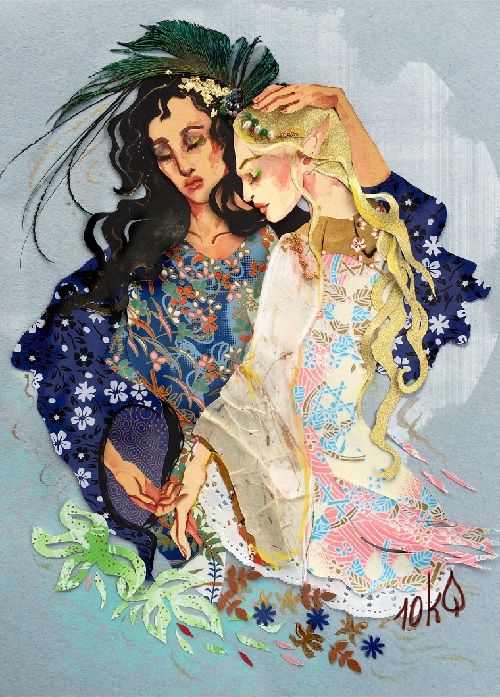
Anyway, the Dwarves of Nogrod are soon on the march in a great host. They head down along their old Dwarf-road, clear across the woods and plains and right past where the Girdle of Melian used to be. The Elves of Doriath resist, of course, but they’re not at the top of their game. In “doubt and despair,” they just don’t have contingencies in place for the absence of their queen’s power. And so now there is war in the chief realm of the Sindar as Elves and Dwarves clash…and there’s nary an Orc to be found. Truly this is one of Morgoth’s finest hours. Sure, he’d been humiliated by Beren and Lúthien, but look where that stolen jewel got the people of Beleriand. And turning Húrin loose brought the Nauglamír to Doriath, setting this whole dire turn of events in motion, didn’t it? Well done, old Melkor. Well done.
And now, right there in the Thousand Caves of Menegroth, the “fairest dwelling of any king that has ever been east of the Sea,” which were carved by the hands of both Elves and Dwarves, people of both races are slaughtered. Mablung of the Heavy Hand is tragically slain right there before the doors of his king’s treasure vault. I’d like to think he got in a few pun-based one-liners against his foes or was at least extremely heavy-handed in his defense of Menegroth, but ultimately this is the end of the road for him. And many, too many, on both sides.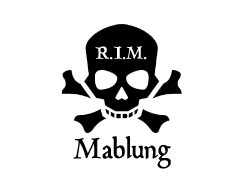 The Silmaril+Nauglamír is eventually swiped and given to the Lord of Nogrod, the Dwarf chieftain who’d led the assault, and a whole lot of treasure gets stuffed into Dwarven pouches, bags, and chests. Then, with loot in hand, they all retreat from Doriath and head back east. Those who survived do, anyway, since there are way fewer than the numbers that set out.
The Silmaril+Nauglamír is eventually swiped and given to the Lord of Nogrod, the Dwarf chieftain who’d led the assault, and a whole lot of treasure gets stuffed into Dwarven pouches, bags, and chests. Then, with loot in hand, they all retreat from Doriath and head back east. Those who survived do, anyway, since there are way fewer than the numbers that set out.
They get pretty far, well beyond the trees of Doriath and across the fields. But when they reach the ford of the River Gelion, Sarn Athrad, where the well-trodden Dwarf-road starts up toward the mountains, battle erupts again as arrows come singing out of the trees. The Green-elves of Ossiriand are upon them! No one steals from the Eldar and gets away with it! And with these Green-elves is Beren, called out of retirement for one last job. And with him is his son, Dior—who, we’re told, had by this time married a Sinda named Nimloth, who in turn is a kinswoman of Celeborn—who was a kinsman of Thingol’s, and as we all know married Galadriel.
Got all that?
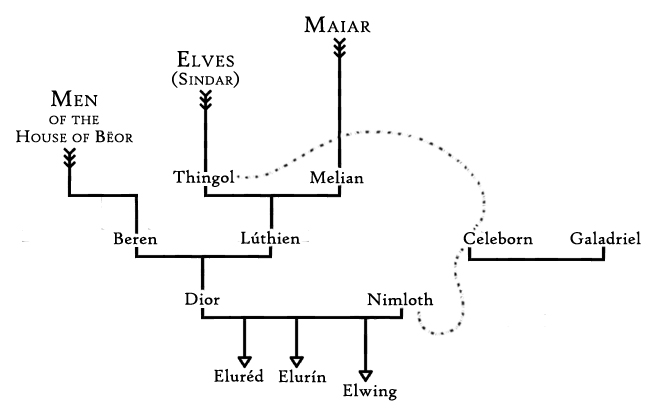
Yep, we’re even told, right in the middle of this action-packed corner of the chapter, that Beren’s son already has three young children of his own! Two little lads, Eluréd and Elurín, and one baby girl, Elwing. And these kids are special indeed. They’re the first of the Half-Elven. And—wait, that’s right, Beren and Lúthien are already grandparents! Where does the time go?
Well, let’s get back to the action. The Dwarves are getting sniped by the Green-elves at Sarn Athrad. The Lord of Nogrod is slain by Grampa Beren who is, no doubt, still pretty good even fighting one-handed. When he takes up the Nauglamír and sees the Silmaril—ugh, this old thing again, which Beren himself first pried from Morgoth’s crown back on that crazy first date with his girlfriend long ago. He rinses the blood off the world’s most high-profile MacGuffin in the waters of the Gelion.
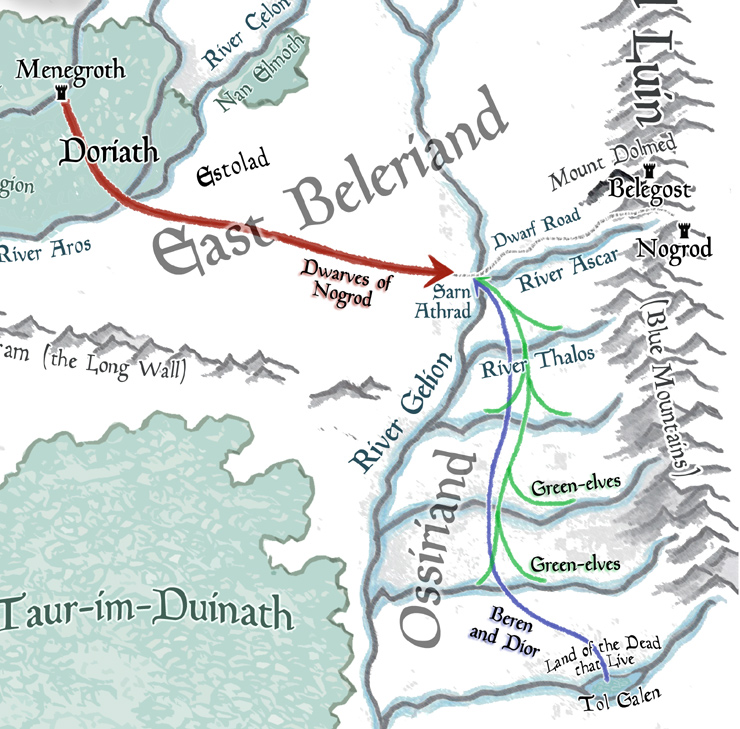
Meanwhile, some of the Dwarves did escape even that rout, and hurry their way along the Dwarf-road and up toward their city in the mountains. And that’s when J.R.R. Tolkien tosses all us Ent fans a bone. Maybe more of a morsel. A twig?
Just a breadcrumb, really:
And as they climbed the long slopes beneath Mount Dolmed there came forth the Shepherds of the Trees, and they drove the Dwarves into the shadowy woods of Ered Lindon; whence, it is said, came never one to climb the high passes that led to their homes.
And that’s really all we get. But hey, we’ll take it. Ents (and probably Entwives, too!) are totally on the scene for the first time ever, fulfilling Yavanna’s warning to her husband, Aulë, about the inevitable conflicts between his handmade children and her creations. Now, is this the only true conflict between Ents and Dwarves? Surely not, given the bearded folks’ (a) need for wood to fuel their forges, and (b) the sharpness of their axes. But this is the only one that factors into the great recorded histories of Middle-earth. Also, there’s no way that Treebeard, the oldest of them, isn’t here among the others—however many that is—squashing greedy Dwarves and probably being uncharacteristically hasty about it, too! Old Fangorn never mentions this moment to Gimli, but he probably has a flashback when he looks “dark-eyed” at him in The Two Towers. And clearly in this situation, the Shepherds of the Trees are on the side of the Elves. As much as anyone’s on their “side,” I suppose…
And now for the high-level aftermath.
First the Green-elves of Ossiriand dump all the stolen treasures of Menegroth right there in the River Ascar (which runs perpendicular to Gelion), since the Lord of Nogrod had cursed it as he was dying, and anyway, what need does anyone have for it now? Whatever economy Beleriand had is surely in a poor state, by this point. Oh, then they go and rename the river because duhh, something notable happened there.
Beren takes the Necklace of the Dwarves back with him to Tol Galen and gives it to his wife, who is grieving not only for the death of her father but now for the loss of so much life over mere jewelry. Yet she wears it, because it is meaningful and powerful. So now Lúthien Tinúviel, half-Sinda and half-Maia, already the most beautiful of the Children of Ilúvatar, now wears the Nauglamír, loveliest of the works of the Dwarves, which in turn displays a Silmaril, the pinnacle of the artifice of the Elves. It almost seems too much, right? It should be garish, kitsch, overwrought. But nope. She pulls it off. Lúthien at this time is the “vision of the greatest beauty and glory that has ever been outside the realm of Valinor,” and the so-called Land of the Dead that Live around their island becomes comparable to the deathless land of Aman itself. For a little while. Remember, all things pass eventually.
Soon after, their son Dior leaves the nest with his wife, Nimloth, and their three kids. Why? Because he is now Thingol’s heir and it’s his duty to salvage what they can of Doriath in the wake of its war. The Sindar welcome him, and for a while joy returns to Menegroth. Dior is the new king and he plans to “raise anew the glory of the kingdom of Doriath.” Yay!
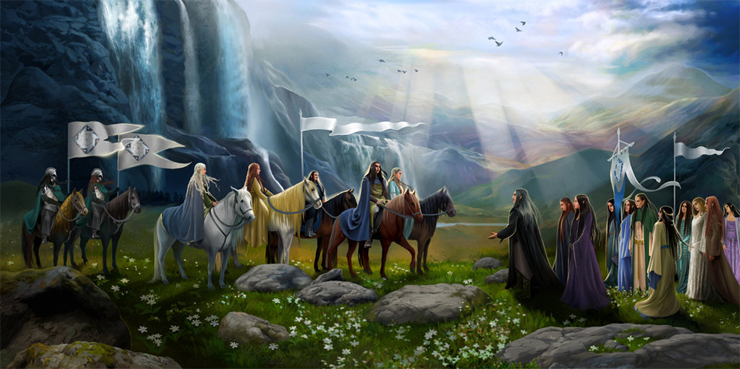
But this is Arda Marred, there’s still a Dark Lord in the north, and because of the sons of Fëanor, Beleriand can’t have nice things. It starts with Dior one day receiving precious cargo from a visiting lord of the Green-elves: the Necklace of the Dwarves, still housing the Silmaril. He knows this means that his parents have finally died and “gone where go the race of Men to a fate beyond the world.”
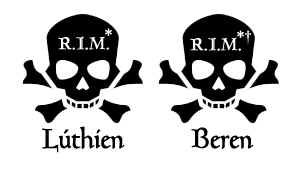
† AGAIN.
This is heavy news for Dior, though it is little surprise, as it was foretold that the power of the Silmaril can speed them on towards their fate beyonds fates. It was, after all, much “too bright for mortal lands.” And so now he wears the Silmaril as the heir of three races: Men, Elves, and Maiar. He’s a sight to behold, just like his legendary mom.
But news travels fast, and the Silmaril’s presence in an unguarded Doriath stirs up the sons of Fëanor. They’ve all been lying low abroad, but these tidings force them to act at last. I say “force” because their terrible Oath, twice made, drives them ever on…even though they totally never tried to get a Silmaril from Morgoth himself, nor did they do more than send messengers to Thingol when he’d held one. And they certainly never had the nerve to seek Lúthien when she wore it. But Lúthien’s son, without her or Beren around? Absolutely. They give Dior exactly one chance to cough up the Silmaril, and he doesn’t respond at all.
Tragically, all seven of Fëanor’s boys come forth with military force. Yes, even Maedhros, the “good” one, and Maglor, the secondborn minstrel who personally composed a song of lament over the Kinslaying in Alqualondë. But it’s Celegorm, easily the douchiest of the seven, who leads this charge in the middle of the very next winter, taking Menegroth by surprise.
Thus for a second time there is battle in the Thousand Caves, but this time it’s Elf-on-Elf, making this a second kinslaying. GAH. This is somehow worse than the first time, possibly in that it’s entirely premeditated. At least in Alqualondë, Fëanor and his gang started killing the Teleri only when the Teleri started to shove the Noldor off their boats—more of a crime of passion. This time, their Oath has made murder more of a certainty. Dior, and by extension the Elves of Menegroth who rise up in his defense, held, took, and kept a Silmaril—therefore they are pursued with vengeance.
So brief is the account of this battle that it almost feels like the narrator is afraid to zoom in too closely. The body count isn’t given, but many appear to be slain. And—silver lining—that includes all three C-brothers!
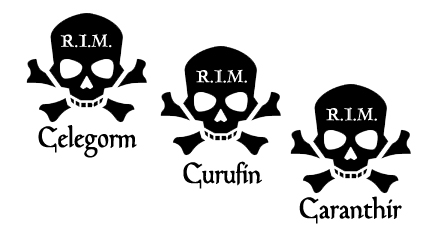 To his credit, Dior himself is the one to slay Celegorm—which feels like justice served, as Celegorm once tried to forcefully marry Dior’s mom (and that’s putting it nicely) and stood with his brother Curufin as that one tried to kill Lúthien himself. These guys had this coming for a very, very long time. And now it’s time for a serious timeout in the penalty box of Mandos. I hope Huan is there when he arrives just so he can give his former master a look of stern disappointment.
To his credit, Dior himself is the one to slay Celegorm—which feels like justice served, as Celegorm once tried to forcefully marry Dior’s mom (and that’s putting it nicely) and stood with his brother Curufin as that one tried to kill Lúthien himself. These guys had this coming for a very, very long time. And now it’s time for a serious timeout in the penalty box of Mandos. I hope Huan is there when he arrives just so he can give his former master a look of stern disappointment.
Yet sadly, Dior and his wife, Nimloth, are also killed in this horrific kinslaying.
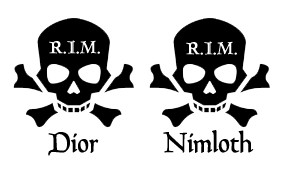 Even worse—and this is specifically called out—the “cruel servants” of Celegorm steal away the king and queen’s young sons, Eluréd and Elurín, taking them deep into the wild and then abandoning them to starve. We’re talking probably 6-year-old boys. In Morgoth’s Ring, it’s said that Elven bodies mature more slowly than do the bodies of mortal children, so these are real little kids. When he learns of this, Maedhros actually seeks them out; he is not cool with this, and it’s said he “repents” for it (presumably on behalf of his asshole brothers). But he tries and fails to find them. And since they pass out of all knowledge and history, it’s assumed that the two twins eventually perish.
Even worse—and this is specifically called out—the “cruel servants” of Celegorm steal away the king and queen’s young sons, Eluréd and Elurín, taking them deep into the wild and then abandoning them to starve. We’re talking probably 6-year-old boys. In Morgoth’s Ring, it’s said that Elven bodies mature more slowly than do the bodies of mortal children, so these are real little kids. When he learns of this, Maedhros actually seeks them out; he is not cool with this, and it’s said he “repents” for it (presumably on behalf of his asshole brothers). But he tries and fails to find them. And since they pass out of all knowledge and history, it’s assumed that the two twins eventually perish.
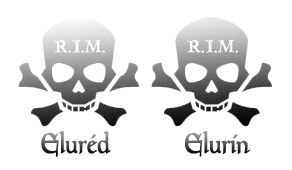
As Doriath now surely has.
That’s a second Elf-realm checked off Morgoth’s list, and he didn’t have to send a single Orc! Another red-letter day for the Dark Lord in Angband.
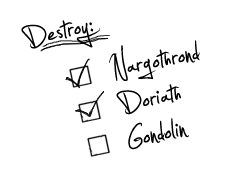
But you know what the surviving four sons of Fëanor don’t get? The Silmaril. It, and the Elf toddler Elwing (Dior and Nimloth’s youngest), are secreted away by a remnant of the Elves of Doriath who escape the bloodshed. They head south to the Mouths of Sirion by the sea.
Well, little Elwing, now without her brothers, is going to be super important someday. She’s been name-dropped without detail a few times in The Silmarillion before now, but this chapter begins her story. Her name means Star-spray, “for she was born on a night of stars, whose light glittered in the spray of the waterfall of Lanthir Lamath beside her father’s house.”
Since the sons of Fëanor have reared their heads again, and now are down three of them, it’s time again to roll out that trusty descendants-of-Finwë chart, which sure is looking a bit ragged. Morgoth has done a serious number on the the Noldor and their royals, directly and indirectly. I mean, yikes, only four of Fëanor’s kids are left, one of Fingolfin’s, and one of Finarfin’s. But hey, at least some of promising great-grandkids have been popping up.
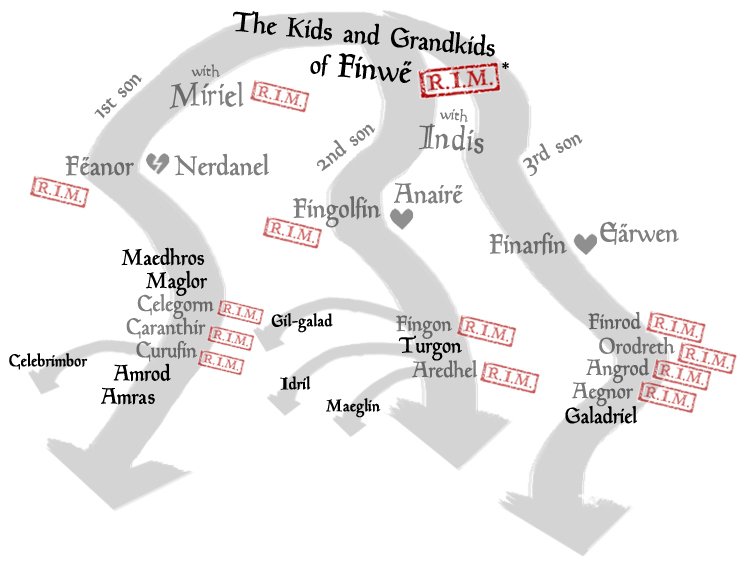
In the next installment, we’ll finally go back to the Hidden City, the last realm standing, as we tackle “Of Tuor and the Fall of Gondolin.” It’s high time Ulmo gets back in the game, innit?!
Top image from “Death of the Lord of Nogrod” by O.G. (steamy).
Jeff LaSala can’t leave Middle-earth well enough alone. But Tolkien geekdom aside, he wrote a Scribe Award–nominated D&D novel, produced some cyberpunk stories, and now works for Tor Books. He is sometimes on Twitter.


